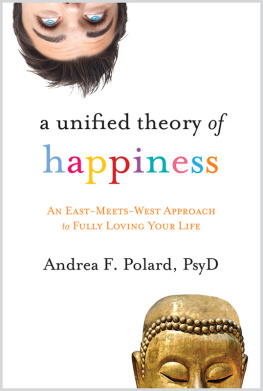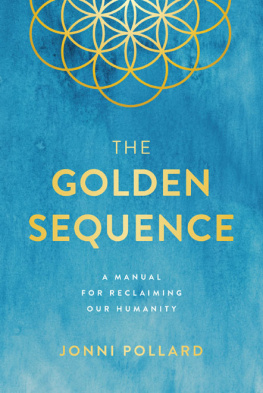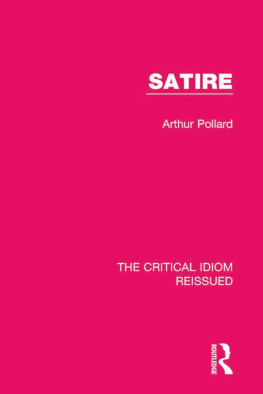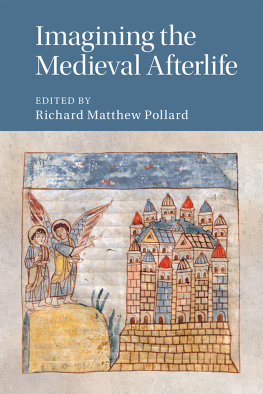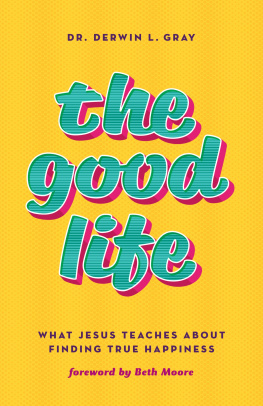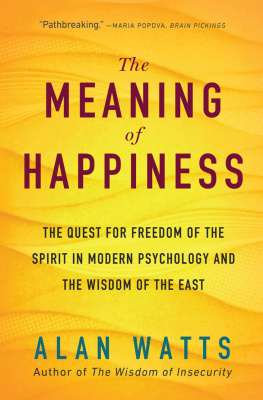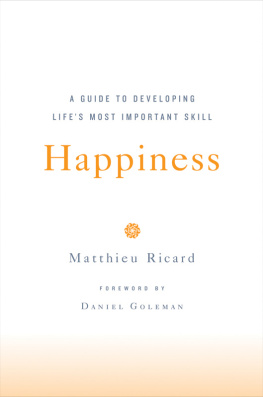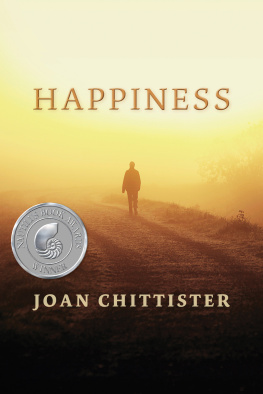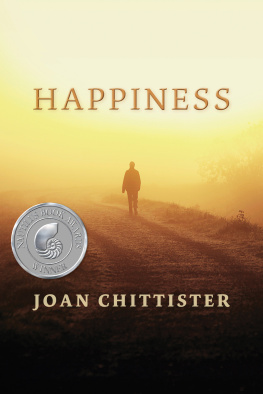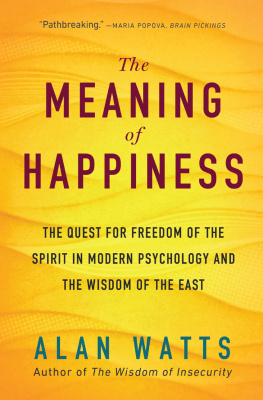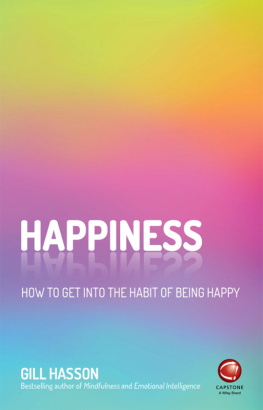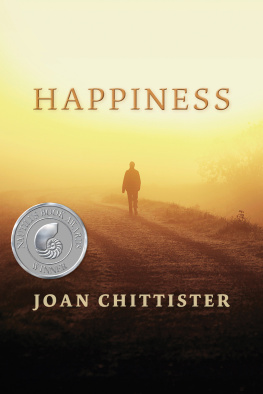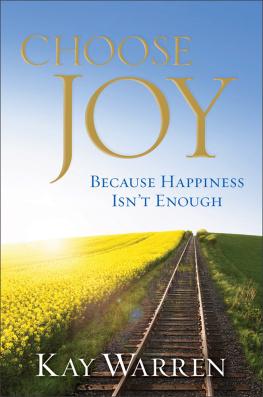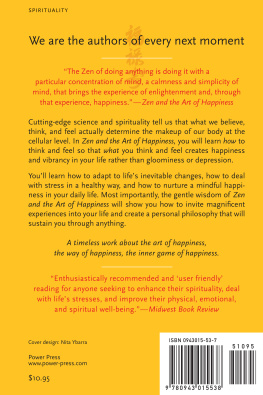a unified theory of
happiness
A N E AST- M EETS- W EST A PPROACH to F ULLY L OVING Y OUR L IFE
Andrea F. Polard, PsyD

Sounds True, Inc.
Boulder, CO 80306
Copyright 2012 Andrea F. Polard
Foreword copyright 2012 Teresa Wright
Sounds True is a trademark of Sounds True, Inc.
All rights reserved. No part of this book may be used or reproduced in any manner without written permission from the author and publisher.
All names used throughout the book have been changed to protect patients privacy.
The poem (Autumn) on page 49 is reprinted by permission of HarperCollins Publisher. Autumn (lines 13, 67) from Selected Poems of Rainer Maria Rilke: A Translation from the German and Commentary by Robert Bly. 1981 by Robert Bly.
The lines from The Sandokai on page 259 is reprinted by permission of University of California Press Books. These lines appear on page 191 in Branching Streams in the Darkness: Zen Talks on the Sandokai by Shunryu Suzuki. 1999 by The Regents of the University of California.
The Faust excerpt on pages 276277 is reprinted by permission of Anchor Books. The lines appear on page 95 in Goethes Faust by Johann Wolfgang von Goethe, translated by Walter Kaufmann. 1962 by Walter Kaufmann.
The poem (The snow whisk) on page 285 is used by permission. It appears on page 67 of On Love and Barley: Haiku of Basho, translated with an introduction by Lucien Styrk (Penguin Classics, 1985). Lucien Stryk, 1985.
Published 2012Cover and book design by Rachael Murray
Photos on cover Minerva Studio and Cbenjasuwan from Shutterstock.com
Illustrations Lack-OKeen, KoboldArt, W7, Christopher Jones, MedusArt
Printed in Canada
Library of Congress Cataloging-in-Publication Data
Polard, Andrea F.
A unified theory of happiness : an East-meets-West approach to fully loving your life / by Andrea F. Polard.
p. cm.
Includes bibliographical references and index.
ISBN 978-1-60407-788-9
1. Happiness. 2. Confidence. 3. East and West. I. Title.
BF575.H27P65 2012
158dc23
2011039317
eBook ISBN: 978-1-60407-818-3
To the love of my life, the ever-caring father, the humanist,
the last lion, the man who sees God in nature,
the inspired gardener and artist, Steven Gregory Floren Polard.
He who binds to himself a joy
Does the winged life destroy;
But he who kisses the joy as it flies
Lives in eternitys sun rise.
WILLIAM BLAKE, ETERNITY
Contents
by Teresa Wright, PhD
Foreword
I m not a Buddhist or a psychologistnot even a person likely to open a self-improvement or spiritual bookbut rather a professor of political science and an expert on China. And yet, I found myself surprisingly and deeply moved by this remarkable book. Pondering what was so different about A Unified Theory of Happiness, I concluded that it accomplishes something unique and transformative: it unifies not merely Western and Eastern concepts (thus satisfying the readers thinking mind), but also provides something non-conceptual, something beyond words and worldviews, speaking to and transforming the readers physical and spiritual mind.
In part it is Dr. Andrea Polards style of language that elicits such a complete human response. The prose is not pragmatic, especially not for the research-based, scientifically sound study that it is. It is carefully crafted language with a poetic rhythm. The author refers to poetry with frequency, arousing aesthetic sensibilities in the reader. Interspersing the written language with graphics, images, a questionnaire, and exercises, the book engages the reader visually and personally. All of this makes the medicinethe many practical skills, exercises, building blocks, strategies, and Eastern techniques and pathsgo down with ease and pleasure, opening the mind on many different levels simultaneously.
Beyond style, A Unified Theory of Happiness unites Western and Eastern approaches to happiness into one theory that Dr. Polard calls the Theory of Elastic Consciousness. It is not derived by finding commonalities in the causes of happiness, but rather by examining experiences of happinessexperiences that at first seem too diverse to cohere. Experiences of success, for example, are very different from experiences of love for people; experiences of love for people are very different from experiences of love for humanity or for life itself. Dr. Polard identifies what unites all of these experiences: namely a form of vibrancy, a stream or flow of consciousness, and a certain life quality, either generated in an active mode of consciousness or realized in a non-active mode of consciousness. The books beauty is greatest when the reader begins to fathom that these two modes are already unified within consciousness, and that all that is left to do is to give attention to that whole.
Happiness has evaded far too many people. People have been seen as either happy or notas if happiness is something one is born with or stumbles upon by luck. Fractions of happiness have been addressed in other books. A Unified Theory of Happiness is differentit makes the whole of happiness accessible to all. In a world too often filled with unhappiness, fear, materialism, and greed, this book shines. Do yourself a favor and read it; it will help you find happinessor help happiness find you.
Teresa Wright, PhD
Chair and Professor, Department of Political Science,
California State University, Long Beach
Author of Accepting Authoritarianism: State-Society Relations
in Chinas Reform Era and The Perils of Protest: State Repression
and Student Activism in China and Taiwan
Acknowledgments
T his book would not be in your hands right now if it were not for my visionary publisher Tami Simon; the one and only Jennifer Y. Brown who found me; my masterful editor Florence Wetzel; copyeditor Elisabeth Rinaldi; and the whole spirited team of Sounds True. Thank you all.
Would I be at this juncture without the recommendation and encouragement of Rick Hanson, author of Buddhas Brain, and Howard Gardner, author of Multiple Intelligences, and his latest work Truth, Beauty, and Goodness Reframed? I will never know for sure. What I do know for sure is that they have touched my heart and caused me to believe in kindness even more. Thank you both.
I want to acknowledge all those who have inspired and enriched me with their ideas, but the list would be too long and, Im afraid, incomplete. I am very grateful to all of you.
To my family and friends, thank you for being there during the last twelve years of writing this book, especially Sabina Floren and my mother, Elisabeth Floren; my beloved buddy Margo Gladjie; beloved Uncle Matthias Beltinger; and one bright star under the intellectual firmament: Sean Kearney. Also, thank you Teresa Wright for writing such a beautiful foreword.
Special thanks to the former head of the Zen Center of Los Angeles, my Zen teacher Bernard Silvers: your wisdom, compassion, and humility have greatly strengthened my experience of the all to which I belong.

